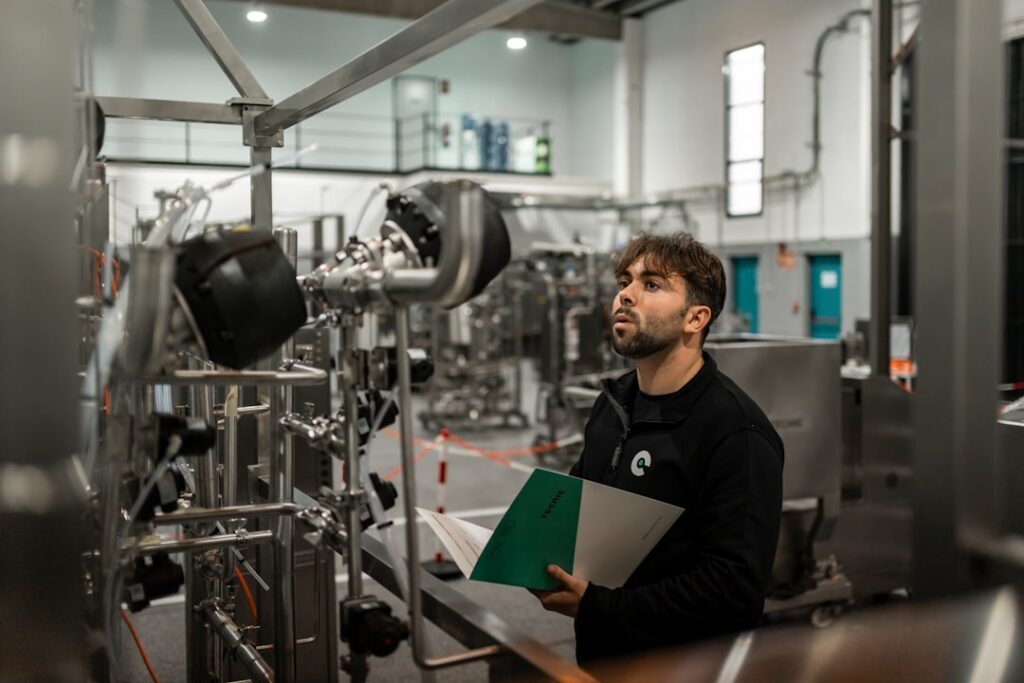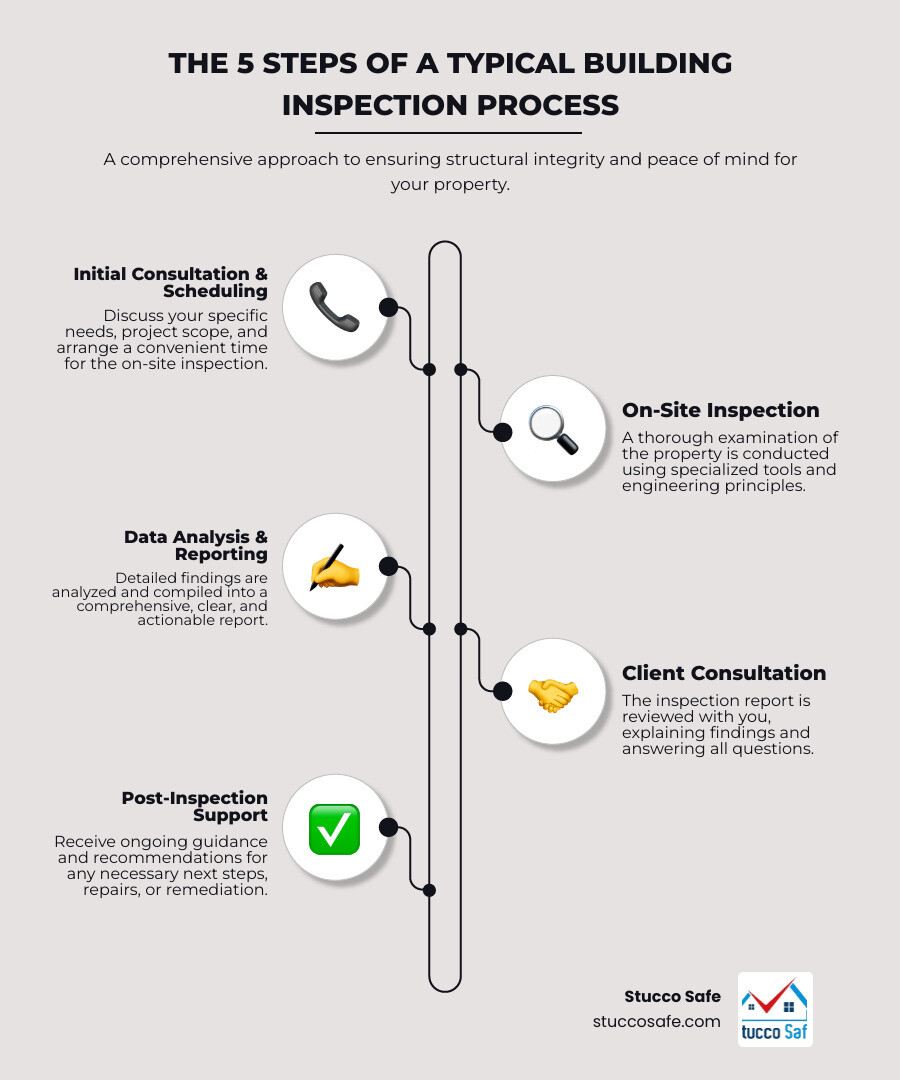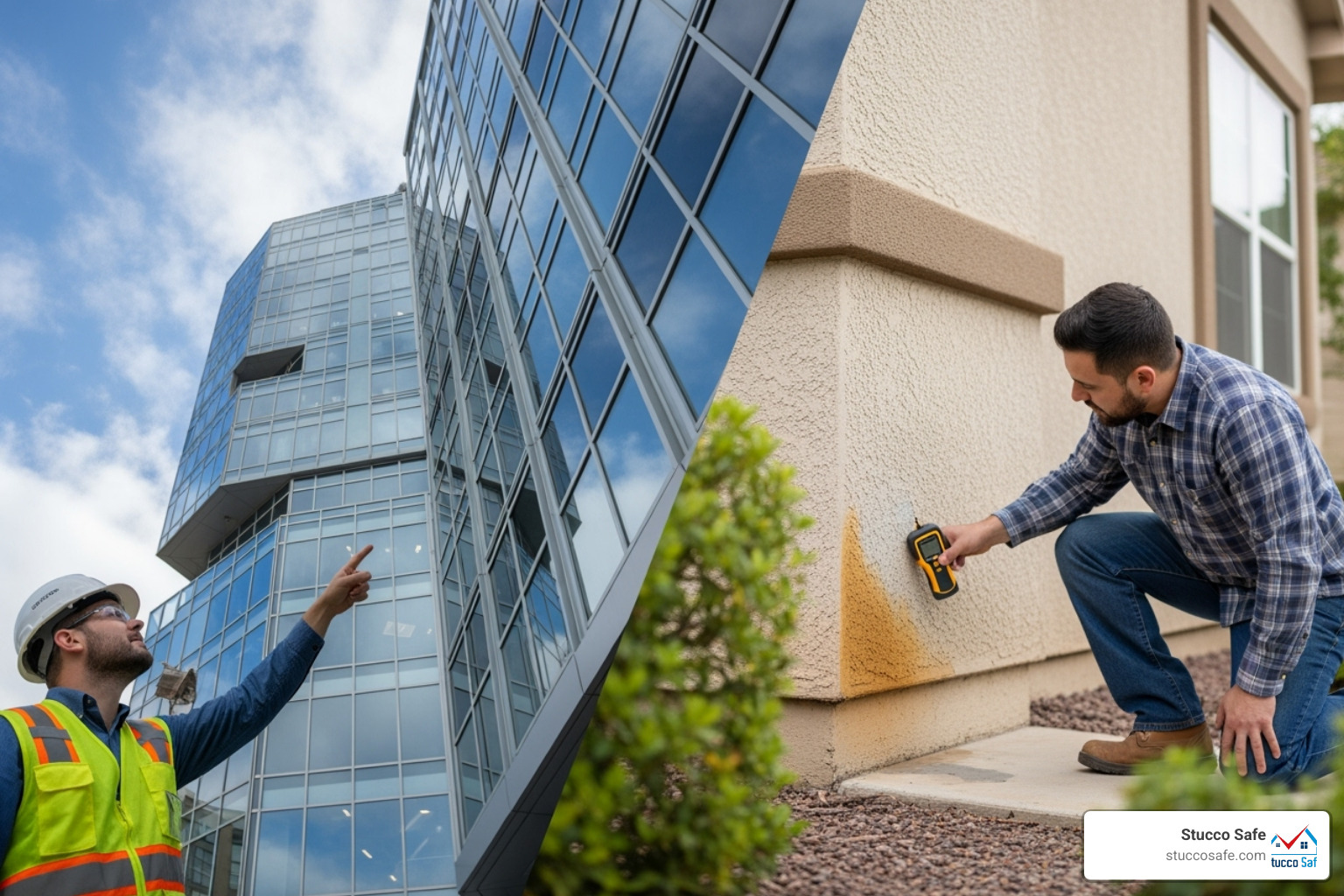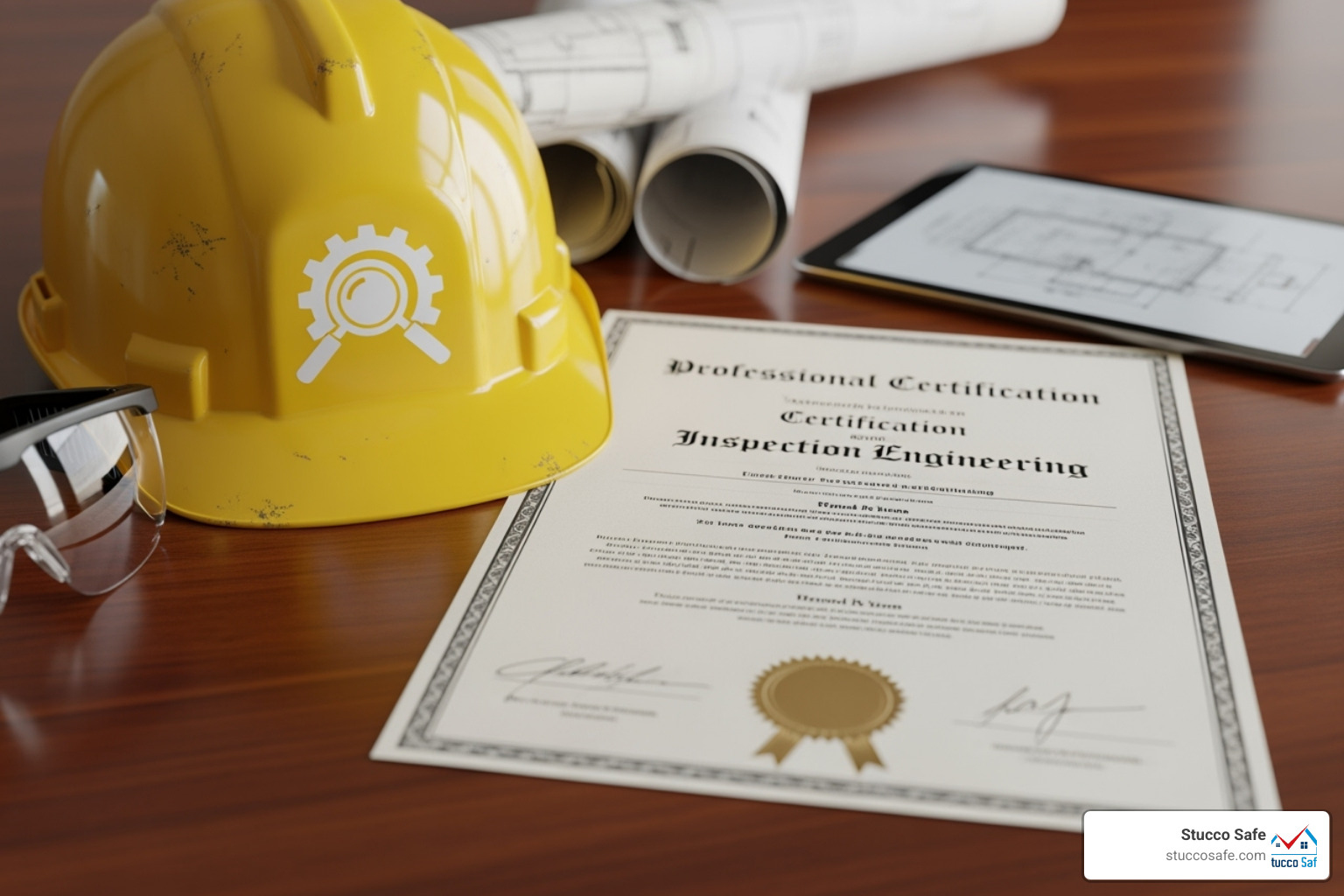Inspection Engineering: Your Perfect 2025 Guide
Introduction: The Unseen Guardians of Structural Integrity
Inspection engineering is a specialized field focused on assessing the condition, safety, and compliance of structures and systems. Professionals in this field perform crucial services to:
- Evaluate structural integrity, including foundations and framing.
- Detect hidden problems like moisture intrusion or material damage.
- Ensure a property meets safety standards and building codes.
- Provide clear, detailed reports for informed decision-making.
- Help prevent costly future repairs.
This work is vital for high-risk industries and equally important for your home. In regions like Southeastern Pennsylvania, hidden issues such as moisture in stucco can cause significant structural problems if not detected early. A thorough stucco inspection, costing between $495 and $1595+ for large homes, is a small investment to protect your biggest asset.
My name is Gabe Kesslick, and I have specialized in leak detection and repair since 2001, founding Stucco Safe in 2015 to provide high-quality inspection engineering for stucco and building envelope issues. My experience includes forensic investigations and expert testimony, ensuring I understand the critical details of structural integrity.
What is an Inspection Engineer and Why Are They Crucial?
An inspection engineer is a highly skilled professional who applies engineering principles to assess the condition, strength, and safety of structures and systems. Think of them as guardians of your property’s health, uncovering hidden issues before they become major problems and providing you with peace of mind.
Their primary job involves a mix of scientific analysis and hands-on investigation to:
- Evaluate Integrity and Safety: Look deep beneath the surface to assess a property’s structural soundness.
- Conduct Thorough Inspections: Use specialized tools and techniques, from visual checks to advanced testing, to gather critical data.
- Identify Potential Issues: Spot weaknesses, flaws, or problem areas that might not be obvious.
- Ensure Compliance: Verify that a property adheres to safety regulations, building codes, and industry standards.
- Prevent Failures: Find and address issues early to help prevent accidents, structural collapses, and system breakdowns.
- Provide Recommendations: Offer clear, actionable advice for repairs, maintenance, and future problem prevention.
While inspection engineering covers everything from oil rigs to factory equipment, our focus is on residential and commercial buildings. We apply the same rigorous engineering principles to examine a building’s envelope—its foundation, stucco, siding, roof, and windows. Our goal is to find problems that could compromise safety, lead to expensive repairs, or diminish property value. According to the Bureau of Labor Statistics (BLS), overall engineering jobs are projected to grow, highlighting the increasing need for our specialized skills.
The Typical Work Environment
An inspection engineer’s career is a dynamic mix of fieldwork and office analysis. This dual environment requires a versatile skill set.
Field Work: A significant portion of the job is spent on-site conducting inspections. For us at Stucco Safe, this means visiting properties across Southeastern Pennsylvania, New Jersey, and Delaware. Field work involves physically examining stucco, foundations, and other building components in various weather conditions. It requires physical activity, adherence to strict safety protocols, and hands-on data collection, such as using moisture meters to find hidden water behind stucco.
Office Work: After the on-site inspection, the focus shifts to analysis and reporting. This includes planning inspections, reviewing blueprints, and analyzing collected data like test results and thermal images. The primary task is to write comprehensive, easy-to-understand reports that detail findings, conclusions, and recommendations. This phase also involves collaborating with clients, contractors, and legal teams, as well as staying current on the latest building codes and technologies.
Demand and Earning Potential
Inspection engineers are in high demand across industries like construction, energy, and real estate due to the constant need for safety, compliance, and asset protection. The Bureau of Labor Statistics (BLS) projects a 5% growth for all engineering jobs from 2020 to 2030. For specialists in forensic building investigations, such as stucco moisture analysis, the demand is often even greater due to the complexity of the problems and the potential for significant property damage.
This demand is reflected in the earning potential. According to Glassdoor, an Inspection Engineer in the United States earns an estimated total pay of $106,865 per year, including an average salary of $90,132. Salaries vary based on location, industry, experience, and specialization. Professionals with our niche expertise in forensic building inspections in areas like Southeastern Pennsylvania, New Jersey, and Delaware often earn at the higher end of this range due to the critical, high-stakes nature of our work.
The Spectrum of Inspection Engineering: From Commercial Buildings to Your Home
While inspection engineering covers everything from industrial plants to manufacturing parts, our focus is on the buildings where we live and work. We apply robust engineering principles to ensure your home or commercial property is safe, sound, and maintains its value. It’s about understanding how buildings perform over time and how to fix issues before they become major problems.
Within the built environment, our work is diverse and crucial:
- Building Applications: We inspect and analyze all components and systems, from the foundation to the building envelope—the outer shell that protects the interior from the elements.
- Quality Control: For new construction or renovations, we act as an independent third party to ensure work is done to design specifications, meets building codes, and adheres to quality standards. This proactive approach prevents future issues, like moisture intrusion in a new stucco system.
- Forensic Analysis: When things go wrong, we become building detectives. We investigate the root cause of failures or defects, such as mysterious water leaks or material degradation. This is especially critical for hidden moisture damage in stucco, where we piece together evidence to provide clear answers.
- Pre-Purchase/Pre-Sale Assessments: In real estate markets like Philadelphia and West Chester, our inspections provide buyers with clarity on a property’s true condition and help sellers address concerns upfront for a smoother sales process.
Specializations in Building Inspection Engineering
Inspection engineering for buildings is highly specialized. Our focus is on the key areas that protect your property:
- Building Envelope Inspector: This specialist focuses on the building’s exterior shell—walls (stucco, brick, siding), roof, windows, and foundation. They examine these components for weaknesses related to water intrusion, air leakage, and energy efficiency. Our work with stucco is a prime example of ensuring the integrity of this protective envelope.
- Moisture Intrusion Specialist: Water is a building’s greatest threat. This expert finds, diagnoses, and recommends solutions for water intrusion. Using tools like thermal imaging cameras and moisture meters, along with forensic testing, they pinpoint hidden leaks and assess the extent of the damage. Our Moisture Intrusion Detection services are designed to uncover these invisible threats.
- Forensic Building Inspector: When a building problem is complex or involves legal disputes, this professional investigates the root cause of failures or defects. They provide evidence for lawsuits or insurance claims through detailed analysis and comprehensive reports. We are experts in Forensic Building Inspections and can serve as an Expert Witness for Stucco Defects.
- Structural Inspector: This inspector focuses specifically on the load-bearing elements of a building, such as the foundation, beams, columns, and framing. They look for signs of movement, cracks, or damage that could compromise the building’s overall stability.
The Focus of Residential & Commercial Inspection Engineering
For both homes and commercial properties, our inspection engineering services provide a complete picture of a building’s health. We use advanced techniques to find hidden problems that could lead to major repairs.
- Structural Integrity: We check the soundness of the foundation, framing, and other load-bearing components to ensure the building is stable and safe.
- Building Envelope: We examine the exterior walls, roof, windows, and doors, paying close attention to systems like stucco that can be a source of problems if not installed or maintained correctly.
- Moisture Intrusion Detection: This is a major concern in our service areas of Southeastern Pennsylvania, New Jersey, and Delaware. We use forensic testing methods to find hidden moisture that can lead to mold, rot, and structural damage.
- Forensic Investigation: For complex issues, we conduct a systematic investigation to determine the exact cause of defects. We provide detailed analysis and comprehensive reports for both residential and Commercial Stucco Testing, giving you the clarity needed to resolve disputes or plan repairs. Learn more in our Ultimate Guide to Stucco Inspection.
Structural Engineering Inspection vs. General Home Inspection
Understanding the difference between a general home inspection and a specialized structural engineering inspection is crucial. Think of it this way: a family doctor performs a general check-up, while a specialist diagnoses a specific, complex condition. Both are vital, but they serve different purposes.
Here’s a quick comparison:
| Feature | General Home Inspection | Structural Engineering Inspection |
|---|---|---|
| Scope | A broad, visual check of major systems: HVAC, plumbing, electrical, interior, exterior, roof, foundation, insulation, ventilation. It flags general issues and maintenance needs. | A deep dive into the building’s “bones”: foundation, framing, beams, columns, trusses, and how they connect. It analyzes structural soundness and how loads are distributed. |
| Qualifications | A certified home inspector, often following standards from groups like ASHI or InterNACHI. They have wide knowledge across various home systems. | A Licensed Professional Engineer (P.E.) specializing in civil or structural engineering. This person has deep knowledge of how structures work, materials, and building codes. |
| Report Detail | A general report with observations, photos, and suggestions for further expert checks (e.g., “Get a structural engineer to look at this” or “Talk to an HVAC tech”). | A very detailed technical report, often with scaled drawings, CAD diagrams, photos, engineering calculations, and clear, actionable repair steps. It explains why something is distorted or failing. |
| Cost | Usually $400-$700 for a typical home, sometimes calculated by square footage (10-20 cents per sq ft). | Much higher due to the specialized knowledge and time involved. Hourly rates are often $200-$350/hr. Project costs can range from $400-$700 for small checks (like a single wall removal) up to $3,000-$7,500+ for bigger or more complex jobs. |
A general home inspection is a broad, visual survey of a house’s overall condition. The inspector checks the basic functions of the HVAC system, plumbing, electrical system, roof, and other visible components. They are excellent at spotting general wear and tear but are not structural experts. If they see a potential structural issue, they will recommend calling a specialist.
A structural engineering inspection is a highly focused, in-depth analysis of a building’s core strength. An inspection engineer examines the load-bearing components—the foundation, beams, trusses, and columns—to assess stability and identify any compromises.
When a Structural Engineering Inspection is Necessary
While a general inspection is a great start, there are times when the expertise of a licensed structural engineer is essential:
- Visible Foundation Cracks: Cracks wider than a quarter-inch can indicate serious movement or settling.
- Sagging Floors or Roofs: Any noticeable dip or slope in floors, ceilings, or the roof suggests the underlying structure may be failing.
- Pre-Purchase Diligence: For older homes, or if a general inspector flags a concern, a structural inspection is a wise investment to avoid costly hidden problems. Lenders may even require it.
- Remodeling Plans: If you plan to remove a load-bearing wall or add significant weight (like a heavy kitchen island), a structural engineer must be consulted to ensure the changes are safe and code-compliant.
- Post-Disaster Assessment: After a severe storm, flood, or earthquake, an inspection is vital to check for unseen damage that could compromise long-term stability.
- Complex Defect Investigation: When the cause of a defect is unclear or disputed, a forensic inspection provides definitive answers. Our Forensic Building Inspections are designed for these situations.
What to Expect in an Engineering Report
An engineering report is a highly detailed, technical document designed to provide precise and actionable information. Unlike a general report, it goes deep into the root cause of issues.
When you receive a report from us, you should expect:
- Detailed Findings: A full written description of all observations, defects, and areas of concern.
- Scaled Drawings and CAD Drawings: Visual aids like floor plans that precisely locate damage or structural elements.
- Photographic Evidence: High-quality photos to visually document our findings.
- Cause of Distortion Analysis: A crucial section that explains the root cause of any distortion, cracking, or damage, which is critical for effective repairs.
- Repair Recommendations: Clear, specific, and actionable steps for any necessary repairs or mitigation strategies. This detailed guidance is often sufficient for obtaining building permits or satisfying lender requirements. Our reports, like those detailed in our Ultimate Guide to Stucco Inspection, are crafted to be thorough and useful tools.
The Path to a Career in Inspection Engineering
Becoming an inspection engineer, particularly one specializing in building envelopes and structural integrity, is a journey that combines academic knowledge with hands-on dedication. It’s a rewarding field where scientific principles are applied to solve real-world problems.
Educational Background
The path to becoming an inspection engineer begins with a strong educational foundation. Most professionals start with a Bachelor’s Degree in a relevant field, with Civil Engineering being a top choice for those focusing on buildings. This degree provides essential knowledge of building materials, structural design, and safety principles. Other useful degrees include Mechanical Engineering and Materials Engineering.
A solid grasp of physics and advanced mathematics is also necessary to understand complex structural behaviors and material science. However, classroom learning must be paired with practical experience. Internships, entry-level positions, and apprenticeships under a licensed Professional Engineer (P.E.) are vital for developing the keen diagnostic eye required for this work.
Key Certifications and Skills
Beyond education, specific certifications and skills distinguish a top-tier inspection engineer. These credentials demonstrate a commitment to excellence and expertise.
The Professional Engineer (P.E.) Licensure is one of the most important credentials, signifying that an engineer has met rigorous requirements and is legally authorized to practice, ensuring public safety. For our specialized work, Building Envelope Certifications, such as those from the Exterior Design Institute (EDI) for stucco inspection, are also critical. These show an inspector has advanced knowledge of cladding systems, installation best practices, and defect recognition.
In addition to technical knowledge, key soft skills are essential. An inspection engineer must have strong analytical and problem-solving skills to interpret complex data and diagnose root causes. Excellent communication skills are needed to explain technical findings clearly to clients and, if necessary, provide Expert Witness for Stucco Defects in legal settings. Finally, a sharp attention to detail is non-negotiable, as a minor flaw can indicate a major underlying problem. The best inspectors are also committed to continuous learning to stay informed on the latest codes, materials, and technologies.
Conclusion: Ensuring Peace of Mind with Professional Inspection
We’ve explored the vital world of inspection engineering, revealing how these specialists act as guardians of your property’s health. This field is a deep, scientific dive into the safety and integrity of your home or commercial building. From assessing structural components to uncovering hidden moisture in building envelopes like stucco, our work provides clarity and peace of mind.
Your property is one of your most significant investments, and professional inspection engineering is a crucial safeguard. By identifying issues early, we help you prevent minor problems from escalating into costly and disruptive repairs. A thorough inspection is a proactive measure that allows you to address concerns strategically.
This proactive approach is always more cost-effective than reacting to a failure. Specialized inspections allow for timely intervention, which is especially true for complex systems like stucco, where hidden moisture can silently cause extensive damage over years.
The value of certified expertise cannot be overstated. The specialized knowledge of a certified inspection engineer goes far beyond a general home inspection. Our blend of engineering principles, forensic testing, and detailed reporting gives you the definitive answers needed for informed decisions.
At Stucco Safe, we embody this commitment to excellence. We are Pennsylvania’s leading stucco inspection company, with inspectors holding the highest level of certification from the Exterior Design Institute. We provide unbiased reporting by never offering repair services, ensuring our findings are solely for your benefit. We proudly serve communities across Southeastern Pennsylvania, New Jersey, and Delaware, including Philadelphia, West Chester, Villanova, King of Prussia, Chester County, and many communities in New Jersey like Bayonne, Cherry Hill, Jersey City, Newark, and Toms River. Our mission is to be your trusted resource for building integrity.
Don’t leave the value of your property to chance. Ensure your peace of mind by partnering with certified experts.





